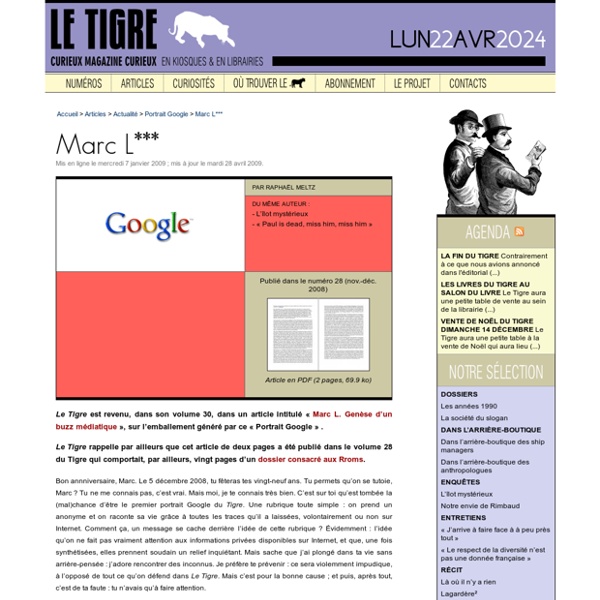



http://www.le-tigre.net/Marc-L.html
Related: Identité, sécurité, responsabilité • TRACES ET IDENTITE NUMERIQUE • identité numérique • mch5Self-hacking / life-blogging / quantified-self & “Moodscope” From program description: “a group of ‘self-hackers’ in London who use the very latest technology to log information about their lives. Are they just data obsessives or can there be positive results? We hear from Jon Cousins who has overcome depression through ‘self-hacking’.” Link to BBC Click radio show
Tracking Attention, Social Activity, and Our Environment Much of the previous coverage in “The Measured Life” has focused on devices to track physical factors, such as sleep, activity and blood pressure. In today’s guest post, Michael Nagle, founder of Sprout, a community education organization, and the head of the Boston branch of the Quantified Self, talks about tools for tracking other facets of our lives and our interactions with the world. Many of the new instruments of the Quantified Self increase our personal capacity to measure our bodies.
What online marketers know about you Andrew Garcia Philips and Sarah Slobin (plus five data gatherers) of The Wall Street Journal report on the prevalence of trackers and cookies on the fifty most popular U.S. websites: Marketers are spying on Internet users — observing and remembering people's clicks, and building and selling detailed dossiers of their activities and interests. The Wall Street Journal's What They Know series documents the new, cutting-edge uses of this Internet-tracking technology. The Journal analyzed the tracking files installed on people's computers by the 50 most popular U.S. websites, plus WSJ.com. Websites (top half) and tracking companies (bottom half) are placed in the circular network diagram.
Data visualization meets game design to explore your digital life The list of one-off applications that visualize your digital life, whether it be your Twitter feed, Facebook updates, or Foursquare checkins, has been growing for a short while. Ben Cerveny and Tom Carden, both Stamen Design alumni, aim to take this idea to the next level with Bloom, with elements of game design. Our mission to bring you a new type of visual discovery experience is already underway. We’re building a series of bite-sized applications that bring the richness of game interactions and the design values of motion graphics to the depth and breadth of social network activity, locative tools, and streaming media services. Track your daily stress and health levels with Basis With the success of FitBit and the current wave of self-tracking, it was only a matter of time before something like Basis came out (currently for pre-order). It's the same idea as FitBit, which is a clip that tracks your movement so you can see how much you move and monitor your sleep patterns. However, instead of a clip, Basis is a watch and comes with additional sensors for heart rate, temperature, and galvanic skin response (sweat). Come near your computer and data uploads automatically via bluetooth. Obviously these new streams of data allow you to interpolate more, in addition to sleep and movement. Temperature readings allow for more accurate estimates for calories burned and the sweat sensor can show something like workout intensity.
Atlas of the Habitual If you had a visualization of every place you've been for 200 days, what could you do with it? What could it tell you about yourself and how could others use the data? Technology allows us to see information in a way we never could before. Atlas of the Habitual is about creating data out of the everyday, the hyper-digitizing of your life. This atlas is a catalog of my experiences over 200 days.
Auger Loizeau: Happylife What would it mean for an electronic device to know more about your partner's emotional state than you do? Or be capable of predicting a future bout of misery through statistical analysis of accumulated data? When does technology become too invasive? Quantified Nerds The quantified self sounds great on paper. The task: keep track of important facets of your daily life. The result: gain a better understanding of your day-to-day and make better educated decisions, based on the numbers instead of false assumptions and shots in the dark. What's not to like? Everyone wants to improve his or herself in some way. To outsiders looking in though, tracking your life in data is ridiculous. Nebul.us Shows You Your Activity on the Web Nebul.us is an online application, currently in private beta, that aggregates and visualizes your online activity. Enter your information for Twitter, Facebook, Flickr, etc and install a plugin in Firefox to record your browsing behavior. Get something that looks like the above, sort of a donut-polar area chart hybrid. Nebul.us calls it a cloud.